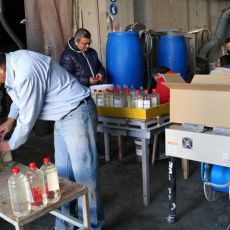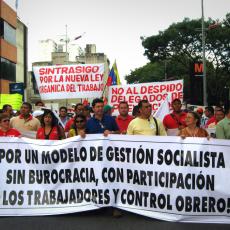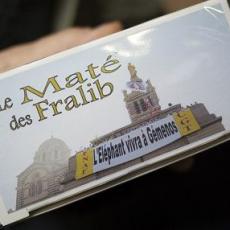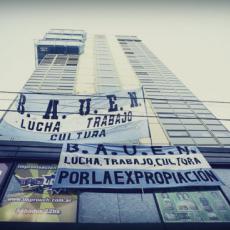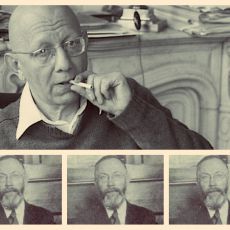Array
-
German11/06/14Aufruf
Als wir am 31.Januar 2013 von unseren Vorgesetzen, der Somuncu Familie vor die Tür gesetzt wurden, fühlten wir uns erst mal hoffnungslos. Wir waren 94 Arbeiter*innen. 4 Monatsgehälter standen noch aus. Abfindungen und Entschädigungen standen uns zu. Die Familie Somuncu hat uns darum betrogen.
Manche von uns gingen nach Hause und andere fanden sich eine andere Arbeit. Unsere Arbeitgeber*innen plünderten die Arbeitsmaschinen, Spinnfäden und fertiggestellten Pullover und machten sich aus dem Staub. Man hinterließ uns einen einzigen Schrotthaufen. Wir waren auch nicht in einer Gewerkschaft organisiert gewesen. Wir hatten bereits Versuche unternommen, uns in einer Gewerkschaft zu organisieren, dies wurde aber von unseren Arbeitgebern durch Unterdrückung und Einschüchterung vereitelt. Aber unsere hatten unsere Arbeitskraft und das gab uns Hoffnung. Und wir waren nicht verzweifelt. Wir fingen mit dem Widerstand an. Wir forderten nun das ein, was uns wegen unserer jahrelanger Arbeit. Zum ersten mal fanden wir uns in einer Demonstration und riefen unsere Parolen. Wir fingen an Erfahrungen zu sammeln und verliessen unsere kleine Welt. Unsere Welt wurde größer und wir erlernten die Solidarität. Wir fingen die Fabrik zu besetzen, als die Familie Somuncu anfing, Produktionswaren aus der geschlossenen Fabrik zu erschleichen und zu stehlen. Vor der Fabrik stellten wir Zelte auf. Später sollten wir diese besetzten. Denn diese Fabrik lief nur mit unserem Arbeitseinsatz. das was uns zustand wurde durch unseren Chef gestohlen. Zur der Besetzung der Fabrik blieben hier 12 Personen. Als wir in die Fabrik betraten, sahen wir, dass unsere Chefs keine funktionierenden Maschinen, sondern Schrott dagelassen hatten. Die noch funktionierende Maschinen wurden durch unsre Chefs kaputt und unbrauchbar gemacht. Wir ließen nicht nach und reparierten die kaputten Maschinen und griffen dann wieder unsere Arbeit an. In dieser Phase fingen wir unter der von uns besetzten Fabrik an zu produzieren. Unser Wiederstand wurde von mitunter mehreren Aktionen begleitet und endete schließlich am Dezember 2013. Wir hatten gewonnen. Die in der Fabrik hinterlassenen unbrauchbaren Maschinen haben wir uns durch Gerichtsvollzug zu eigen gemacht. Unsere Chefs gaben aber nicht in Ruhe schikanierten uns jedoch weiterhin. Einer der Diebe, Umut Somuncu, versuchte durch unvorstellbare Widerspruchsverfahren uns von unserem Vorhaben abzubringen und die gerichtliche Prozedur zu verlängern.
Als wir aber mit dem Widerstand anfingen, sagten wir ja, dass wir nicht ohne jegliche Hoffnung seien. Auch jetzt sind wir nicht. Unser Widerstand ist noch nicht zu Ende. Was sich geändert hat, ist nur die Form, Gegebenheiten und der Ort des Widerstandes. Wir als die Arbeiter*innen von KAZOVA sind bereit zu produzieren. Alles was wir brauchen sind nur ARBEITSMASCHINEN. Wir brauchen Gewebemaschienen. Das durch Widerstand und Solidarität errichtete, DIRENKAZOVA-DIH KAZAK ve KÜLTÜR (Widerstand Kazova-DIH - Pullover und Kultur ) zeigte uns, dass die Arbeitsmaschinen durch Solidarität zu erlangen sind. Wir, die Arbeiter*innen von Kazova sind durch die Solidarität und Zusammenhalt des Volkes so weit gekommen. Wir bauten etwas auf, wofür Unternehmen und Monopole für zehntausende Liras ausgeben hätten müssten, ohne einen Cent zu zahlen. Der Fußboden wurde durch unsere Künstler*innen gelegt und die Bilder durch unsre Arbeiter*innen angefertigt. Der während des Widerstand errichtete KAZOVA-DIH KAZAK ve KÜLTÜR ist zur Symbolfigur des Widerstandes geworden. Wir bevorzugten nicht die Gerichtsäle, sondern die Strassen. Der Fußboden unseres Atelliers zeigt dies. Das Atelier ist inmitten der Strasse und die Strassen sind Mitten in unsrerem Atelliers. Unser Widerstand ist auch auf internationaler Ebene gewachsen.
Am 15. Februar 2014 entwarfen wir Trikots der Jugend-Nationalmannschaften von KUBA und des Baskenlandes. Das ist für uns aus zwei Gründen wichtig. Erstens zeigten wir dem unter dem Embargo und Einkesselung vonseiten der USA leidenden kubanischem Volk unsere Solidarität und zweitens wollten wir dem durch den Imperialismus unterjochten und nicht anerkannten baskischen Volk unsere Anerkennung ihrer Souveränität zeigen. Wir werden den Fußball, der vom Imperialismus am meisten zur Ausbeutung instrumentalisiert wird, ihm entreißen. Der Sport wird dem Volk dienen. Deswegen werden wir mit jedem anti-imperialistischem/r Sportler(in) Kontakt knüpfen. Zu den gehören: Zanetti, Maradonna und Messi. Auch Club Livorno werden wir nicht vergessen. Wir werden nicht mehr zulassen, dass der Sport die Spielwiese der Imperialisten sein wird, womit sie sich die Taschen füllen und als “Morphium” des Volkes einseten. Da DIREN KAZOVA aus dem Widerstand hervorgegangen ist, war es nie Profit orientiert. Es befand sich immer im Widerstand. Es stand den GREIF Arbeitern zur Seite und auch wurden die am 1. Mai Verletzten als erste hier behandelt. Wir waren bei den Familien, welche ihre Angehörigen im Bergwerkmassaker in Soma verloren hatten; und werden es auch immer wieder seien. Wir wissen genauso gut dass wir mit Solidarität unsere benötigten Produktionsmaschinen bekommen werden, so wie wir es mit Solidarität bis hierher geschafft haben. Mit den erworbenen Maschinen werden wir qualitativ hochwertige und preisgünstige Pullover produzieren. Gleichzeitig wird unser errichtetes Atelier als Wahrzeichen für Widerstand und Solidarität stehen.
Wir wollen ein Vorbild sein, wir wollen zeigen dass Arbeiter und Arbeiterinnen auch uunter menschenwürdigen Umständen arbeiten können. Wir wollen zeigen dass man unter menschenwürdigen Umständen produzieren und Widerstand leisten kann.Angefangen von den Arbeitsstunden, der Arbeitssicherheit, den Sozialrechten bis zur Weiterentwicklung unser Kultur und Kunst, wollen wir alles in einem kollektivem Zusammenhalt hervorbringen.
Deswegen wollen wir von hieraus einen Aufruf machen: LASST UNS HAND İN HAND GEHEN UND DİE BENÖTİGTEN ARBEİTSMASCHİNEN FÜR DIE KAZOVA ARBEİTER/İNNEN ANSCHAFFEN. Wir haben uns zum Ziel gesetzt, zehn Produktionsmaschinen zu je 25.000 € zum Aufbau unsreres Ateliers zu besorgen. Während des Widerstands versprachen wir es unserem Volk. Wir werden unser Wort halten. Wir werden günstige und qualitativ hochwertige Pullover für unser Volk produzieren. Wir werden unser Volk nicht den krebserregenden Polyesterfäden ausliefern, mit denen sonst produziert wird. Uns wird kein Chef vorstehen. Wir werden unser eigener Herr sein. Wir werden produzieren und uns selbst verwalten. Wir werden eine Kooperative (Genossenschaft ) gründen, den Privateigentum in unseren eigenen Reihen auszuschließen. Das während des Widerstand entstandene DirenKazova-DIH Kazak ve Kültür ist nun eine neue Widerstandfront. Jetzt führt unser Widerstand an dieser Front weiter. Auch wissen wir, dass uns große Hürden bevorstehen. Doch wir werden jede Hürde nehmen. Wir sind fest überzeugt und wir werden siegen. Unser Weg führt mit kleinen Siegen weiter.
BANKVERBINDUNG KAYA EMİR DÖNMEZ ( KAZOVA WORKER) KONTONUMMER : 213 660 302 712 50 01 ZİRAAT BANKASI İSTANBUL- ŞİŞLİ ŞUBESİ / TÜRKİYE TELEFONNUMMER: 0090-539 655 62 71 0090-(212) 252 96 82
GeographicalΝαιΝαιNoΌχι -
English11/06/14DirenKazova – DİH Kazak ve Kültür
On the 31 January 2013 our boss, the Somuncu family, put us on the doorstep. We felt helpless. We were 94 labourers, our 4 months’ salary, seniority and termination was confiscated with fraud by Somuncu family. Some of us just went home, some found new jobs. Our boss had fled with the machines, yarns and the sweaters we had made. They left us with nothing except scrap. We were without a trade-union. Earlier attempts to be union members were suppressed by the pressure of the boss.
But our hands are producing, labourer hands. And we are not hopeless. We started to resist. We started protecting our rights, our labour and honour we’d been working to gain for many years. We were doing our first march, shouting our first slogans. We gained experience. We came out of our small worlds. Our world grew. We learnt solidarity.
Once we realized the Somuncu family was smuggling goods from the factory, we opened a tent in front of the closed factory for watch outs. Then we occupied the factory. The factory was only producing due to our labour, and we was confiscated from what we had earned. We are left 12 labourers resisting after our factory occupy.
Once we occupied the factory we realized that our boss had left us only with the scrap machines. And the main machines that were not possible to move were ripped apart and the motors taken so we could not use them.
We didn’t give up. We repaired the machines. Then we started to produce in the factory we had occupied. Our resistance carried on with many demonstrations until December 2013 when we finalized it. We had won. We managed to gain the scrap machines that we had fixed in the factory by bailiff. But our boss continued to bother us. Our boss Umut Somuncu who had stolen what was ours did anything he could to drag the bailiff period.
When we started our resistance we said we were not hopeless. And we’re still not hopeless.
Our resistance has not stopped, it is still continuing. Only the format, location and conditions have changed. As Kazova labourers we are ready to start producing. We only need MACHINES. We need weaving machines.
The store we opened DİRENKAZOVA-DİH KAZAK VE KÜLTÜR (RESISTKAZOVA- DIH SWEATER AND CULTUR) in January 2014 proved that with solidarity and resistance we can provide the machines. We Kazova workers; come all this way with the people solidarity and hope. We done all this for free whilst monopolies, companies give tens of thousands of pounds to get the job done. Our artists paved the floorboards, labourers drew pictures.
Resistance gave birth to DİRENKAZOVA-DİH KAZAK VE KÜLTÜR and this will remain the same. We preferred the streets rather than the court yards. That’s the moral of our store grounds. Our store is in the streets, the street is in our store.
Our resistance grew international as well. We manufactured the football shirts that were worn on 15 February 2014 by the Cuban Youth National football team playing against Basque national youth team. This is important in two ways, firstly it has proved our friendship and solidarity with Cuba whilst surrounded by American forces. Secondly we have shown that whilst imperialism doesn’t recognize the national rights of Basque and whilst the Basque people are under invasion, we do recognize the Nation as a country.
We are going to remove imperialism from football where the most intense exploitation of imperialism is. Sport will only serve the public. For this we are going to get in contact with all the teams and players who support anti-imperialism. Zanetti, Maradona, Messi are some of the players we would like to firstly meet. We haven’t forgotten Livorno football team. We are going to stop sport being an area where the imperialists earn money and fib the public.
DİREN KAZOVA (RESIST KAZOVA) has never been a mercantile as it was created from resistance. It has carried on been in resistance. We have supported GREIF workers, we helped and preformed first aid to the injured public in Mayday march. We were mourning with the families of those who lost their lives in the Massacre in Soma coal mine. We are going to carry on be there.
How we came here with solidarity, we are now saying; we can obtain the machines we need with solidarity. With the machines we obtain we will make good quality but cheap sweaters. Also the workshop we are going to create will symbolise our resistance and solidarity. We want to be an example, to show that we can work as labourers with our honour and dignity and produce.
We are aiming to provide collective work from the hours we work, our safety at work; our social rights, our learning of cultural activities. This is why we are making an appeal here.
LET’S GET TOGETHER AND PROVIDE THE MACHINES THE KAZOVA WORKERS NEED.
WE ARE AIMING TO CREATE OUR WORKSHIP WITH 10 WEAVER MACHINES THAT COSTS 22.500 EURO’S EACH.
We promised our people whilst resisting. We are going to hold our promise. We are going to produce good quality but cheap sweaters. We are not going to imprison our public with nylon that is cheap and could cause cancer.
We are not going to have a boss. We are going to be the owners of our own work. We are going to direct and produce our own. We are going to CREATE A COOPERATIVE to prevent private property within ourselves.
Born within our resistance DirenKazova – DİH Kazak ve Kültür is our new location.
Our resistance will carry on here from now. We know there will be many obstacles in our path. We will overcome all. We are determined. We are going to win.
We are continuing our path with small winning. ( 24.05.2014 )
BANK ACCOUNT
KAYA EMİR DÖNMEZ ( KAZOVA WORKER)
ACCOUNT NO: 213 660 302 712 50 01
ZİRAAT BANKASI İSTANBUL- ŞİŞLİ ŞUBESİ / TÜRKİYE
CONTACT NO: 0539 655 62 71
Kazova, Ανακτημένες Επιχειρήσεις, Εργατική Αυτοδιαχείριση, 21ος αιώνας – Εργατικός Έλεγχος στη Σύγχρονη Εποχή, Τουρκία, ΕυρώπηExperiencesΝαιΝαιNoΌχι -
Portuguese, Portugal11/06/14The meeting of politics and work: a psychosocial study on the self-management experience at the Univens cooperative
Este artigo apresenta uma pesquisa de mestrado em Psicologia Social (IP-USP). O objetivo do estudo foi identificar as principais repercussões psicossociais da experiência de autogestão de uma cooperativa de costura de Porto Alegre (RS), a Univens. Buscou-se compreender como a vivência de relações autogestionárias de trabalho afeta as vidas sociais de seus sujeitos, tanto no plano do trabalho quanto no âmbito das relações familiares, comunitárias e citadinas. Estudo de caso, de cunho etnográfico, teve como ferramentas observações e entrevistas semiestruturadas prolongadas, e como apoios teóricos, as obras de Simone Weil e de Hannah Arendt. Entre outros achados, identificou-se que a experiência política vivida por cooperadas no Orçamento Participativo local representou a principal fonte simbólica da cooperativa, tendo inspirado parte de seus princípios, como o caráter igualitário das relações e a gestão democrática e participativa. Concluiu-se que a experiência política propiciou a experiência econômica neste caso. O direito ao trabalho, o pertencimento ao grupo da cooperativa e o enraizamento como sujeitos nos espaços da Vila e do trabalho representaram as principais repercussões destas experiências, chamadas aqui de permanências, na medida em que compuseram um campo estável de referências para essas trabalhadoras, capaz de salvaguardar a manutenção da vida familiar e o poder de intervenção de suas ações políticas cotidianas. Ainda como conclusões, a pesquisa apresentou a empreendipossibilidade de projetar e realizar ações políticas em horizontes mais amplos como uma repercussão de segundo grau destas permanências e, por conseguinte, desta experiência de autogestão, para seus sujeitos.
Palavras-chave: psicologia social, trabalho, política, autogestão, economia solidária.
This article is the result of a research project in Social Psychology (IP-USP). Its goal was to identify the main sociopsychological repercussions of the self-management experience in a sewing cooperative in Porto Alegre (RS) called Univens. It tried to understand how the experience of self-managed work relations affects the social lives of its subjects in the work environment as well as in the family, the neighborhood, and even the city. The investigation is a case-study in which the researcher chose a methodology based on ethnographic observation and the realization of partially structured long interviews and used the works of Simone Weil and Hannah Arendt as theoretical references. The political experience which some of the members of the cooperative made in the local Participatory Budget was the main symbolic wellspring of the cooperative, as it inspired some of its principles, such as its equalitarian work relations and its democratic and participatory management practices. The study came to the conclusion that it was the political experience that led to the economic experience. The right to work, the fact of belonging to the group of the cooperative, and the rootedness as subjects in the spaces of the neighborhood and work represent the main repercussions of these experiences. They are referred to here as permanencies since they made up a stable field of references for these workers capable of safeguarding the maintenance of their family life and the power of intervention of their daily political actions. Finally, the article discusses the possibility of projecting and realizing political actions with a wider horizon as a secondary repercussion of those permanencies and, therefore, of the self-management experience itself for its participants.
Keywords: social psychology, work, politics, selfmanagement, solidarity economy.
Otra Economía, 7(12):45-65, enero-junio 2013
© 2013 by Unisinos - doi: 10.4013/otra.2013.712.03
Συνεταιριστικό Κίνημα, Cris Fernández Andrada, Democratic Revolution, Self-directed Enterprises, Αλληλέγγυα Οικονομία, Κρατικές Επιχειρήσεις, Εργατική Αυτοδιαχείριση, Εργατικός Έλεγχος, 21ος αιώνας – Εργατικός Έλεγχος στη Σύγχρονη Εποχή, Βραζιλία, Λατινική ΑμερικήTopicΝαιΝαιNoΌχι -
Portuguese, Portugal11/06/14Diferentes metodologias das incubadoras tecnológicas de cooperativas populares no Brasil
As incubadoras tecnológicas de cooperativas populares (ITCP’s) funcionam em cerca de vinte universidades brasileiras. O objetivo é apoiar a consolidação de iniciativas econômicas fundamentadas nos princípios da autogestão, a partir de um processo pedagógico orientado pelas trocas entre o “saber popular” e o “saber acadêmico”. Entretanto, as diferenças regionais das comunidades atendidas, as diferenças institucionais das várias universidades e as diferentes perspectivas teórico-metodológicas dos atores envolvidos levou ao aparecimento de diferentes metodologias. O presente trabalho procura comparar as diversas estruturas e metodologias das incubadoras, procurando identificar seus traços comuns e suas diferenças mais marcantes.
The popular cooperative technological incubators (ITCP’s) work in about twenty Brazilian universities. Their aim is to support the consolidation of viable economic initiatives which generate work and income and are founded in self-management principles. The relation between university and community – or among incubators and cooperatives – goes through a pedagogical process intertwined with exchanges between “common sense” and “academic knowledge”. Nevertheless, the regional differences, the institutional differences of the many universities, and the different theoretical and methodological perspectives of the actors involved led to the upcoming of different methodologies and work structure. This work intends to compare various incubators, identifying their common features and their most significant differences.
Antônio Cruz, Συνεταιριστικό Κίνημα, Κοινωνικά Ωφέλιμη Παραγωγή, Αλληλέγγυα Οικονομία, 21ος αιώνας – Εργατικός Έλεγχος στη Σύγχρονη Εποχή, Βραζιλία, Λατινική ΑμερικήTopicΝαιΝαιCurrent DebateΌχι -
Spanish11/06/14año 12 - Nº 1 abril 2007
La bicicleta como medio y como herramienta, fusión de complejidad y sencillez.
De alguna forma el cooperativismo se asemeja a ella.
Permitiendo el movimiento siempre y cuando nosotros seamos parte del mismo.
“In the labor of engines and trades and the labor of fields I find the developments, and find the eternal meanings.” (Walt Withman)
Αντιαποικιοκρατικοί Αγώνες, Δημοκρατικές Επαναστάσεις και Εργατικός Έλεγχος, Συνεταιριστικό Κίνημα, Κοινωνικά Ωφέλιμη Παραγωγή, Αλληλέγγυα Οικονομία, Universidad de la República Servicio Central de Extensión y Actividades en el Medio, Εργατική Αυτοδιαχείριση, Ουρουγουάη, Λατινική ΑμερικήTopicΝαιΝαιNoΌχι -
Portuguese, Portugal11/06/14
Este artigo pretende abordar a formação de Comissões de Fábrica no Brasil dentro de um contexto de ascensão das lutas dos trabalhadores nos anos 1950-68. Nossa hipótese é que as Comissões de Fábricas se formaram como embriões de lutas autogestionárias no Brasil que rapidamente foram estranguladas pelo acirramento da ditadura militar em 1968 e em seguida pela reestruturação produtiva.
Para nós, as Comissões de Fábrica dos anos 1960-70 dificilmente podem ser compreendidas isoladas das lutas dos anos 1950 e 1960. Em função disso, narramos na primeira parte do artigo a) as inúmeras lutas que ocorreram neste momento, dando destaque b) ao papel da “Arquitetura Nova” na crítica à Arquitetura convencional, além da denúncia da nossa miséria pelo “Cinema Novo”; c) a criação da Universidade de Brasília, d) as críticas e ações da União Nacional dos Estudantes; e) as campanhas em defesa do ensino público e da superação do analfabetismo nos anos 1950; f) as lutas pela Reforma Agrária; g) encerramos esta parte com a análise das Reformas de Base no Governo João Goulart e a ruptura histórica iniciada com o golpe de 1964. Para Ribeiro (1997) vivíamos neste momento histórico o “florescimento científico e cultural que o Brasil começava a experimentar nos anos 1960 e que se viu drasticamente crestado” pela opressão da ditadura civil-militar de 1964-1985.
Iniciamos a segunda parte do artigo com um panorama da formação da classe trabalhadora brasileira e das comissões de fábrica até o final dos anos 1950. Em seguida, abordaremos o ciclo das Comissões de Fábrica, que vai de 1968 (acirramento da ditadura civil-militar) a 1978 (fase de distensão e abertura gradual). Encerramos o artigo com algumas considerações finais.
1960-2000 – Εργατικός 'Ελεγχος ενάντια στην Καπιταλιστική Αναδιάρθρωση, Αντιαποικιοκρατικοί Αγώνες, Δημοκρατικές Επαναστάσεις και Εργατικός Έλεγχος, Democratic Revolution, Henrique T. Novaes, Maurício Sardá de Faria, Κοινωνικοί Αγώνες, Συνδικαλισμός, Εργατικά Συμβούλια, Βραζιλία, Λατινική ΑμερικήTopicΝαιΝαιNoΌχι -
Portuguese, Portugal11/06/14
17 de novembro de 2009
Αντιαποικιοκρατικοί Αγώνες, Δημοκρατικές Επαναστάσεις και Εργατικός Έλεγχος, Συνεταιριστικό Κίνημα, Movimento dos Trabalhadores Rurais Sem Terra (MST), Κοινωνικοί Αγώνες, Αλληλέγγυα Οικονομία, Βραζιλία, Λατινική ΑμερικήTopicΝαιΝαιCurrent DebateΌχι -
Portuguese, Portugal11/06/14
Dia cinco do mês de março de 2008. Ocorreu na cidade de Sumaré, em São Paulo, uma audiência pública com o objetivo de discutir a situação da Flaskô, uma fábrica da cidade. Mais precisamente, discutiram medidas viáveis para que ela continue funcionando. Estavam presentes inúmeros trabalhadores, sentados ao fundo da Câmara Municipal, juntamente com representantes de diversos movimentos sociais e de partidos políticos, além de alguns vereadores. A cena mostra claramente que não se trata de uma audiência comum e, tampouco, de uma fábrica comum.
Compondo a mesa da audiência estava o entrevistado desta edição: Pedro Santinho, coordenador do conselho de fábrica da Flaskô. Com formação em administração de empresas e em ciências sociais, ele auxilia na administração e na coordenação de diversas instâncias de decisão da fábrica. Anteriormente desempregado, aproximou-se da Flaskô por conta de seu trabalho de organização junto com os trabalhadores das fábricas Cipla e Interfibra, indústrias de material de construção de Joinville, Santa Catarina.
Para falar da Flaskô “sob o comando dos trabalhadores” é preciso ter em conta o surgimento, recente na história do Brasil, do Movimento das Fábricas Ocupadas, nascido junto com as ocupações na Cipla e na Interfibra. Atualmente, somente a Flaskô e a Álcalis, no Rio de Janeiro, permanecem ocupadas.
A Flaskô é uma fábrica do setor químico-plástico, localizada no Parque dos Bandeirantes, em Sumaré, que foi ocupada em doze de junho de 2003, por cerca de noventa trabalhadores. Como nos diz Pedro – “sabíamos que a fábrica era viável, mas que tinha sido prejudicada por uma série de fatores da época do dono. Isso foi um elemento que permitiu aos trabalhadores lutarem por seus empregos de uma maneira coletiva, ocupando a fábrica (...)”.
O objetivo da entrevista, realizada na própria fábrica, em dezembro de 2007, foi conhecer o que os trabalhadores da empresa denominam de “gestão operária”. Algumas questões motivaram a realização da entrevista, como, por exemplo: como é viver e trabalhar numa fábrica ocupada? Aliás, o que constitui uma fábrica ocupada? O entrevistado sugere alguns caminhos para as respostas contando o processo de ocupação da fábrica e os desafios enfrentados diariamente.
Ainda que o contato com os trabalhadores tenha sido breve, pude perceber um ambiente diferenciado do ponto de vista das relações de trabalho, em que a liberdade de expressão parece se fazer presente. Nesse contato, também pareceu que a luta desses 1 Trabalho realizado sob orientação da professora Leny Sato do Instituto de Psicologia da Universidade de São Paulo.
Agradeçemos ao Thiago de Oliveira e ao Fábio de Oliveira pelas sugestões para o aprimoramento deste trabalho.
Beatriz Ferraz Diniz
Estudante de psicologia do Instituto de Psicologia da Universidade de São Paulo. Contato: biafdn@gmail.comBeatriz Ferraz Diniz, Εθνικοποίηση / Απαλλοτρίωση, Καταλήψεις Χώρων Εργασίας, Κοινωνικοί Αγώνες, Εργατική Αυτοδιαχείριση, Εργατικός Έλεγχος, Εργατικά Συμβούλια, 21ος αιώνας – Εργατικός Έλεγχος στη Σύγχρονη Εποχή, Βραζιλία, Λατινική ΑμερικήTopicΝαιΝαιNoΌχι -
Portuguese, Portugal11/06/14
O presente artigo apresenta algumas reflexões a cerca das lições políticas que se pode tirar das relações entre o movimento dos trabalhadores da Flaskô e o Movimento de Moradia do Vale Bandeirantes que, juntos, construíram a Vila Operária e Popular e, hoje, lutam pela declaração de interesse social da fábrica, e por sua Estatização. Através de uma breve análise desta experiência de luta pela habitação, é abordada a complexa composição social do movimento, sua estrutura, organização, direção e seu desenvolvimento político. Também é abordada a luta das diferentes classes sociais pelo espaço urbano, e as formas que ela assume na crise do capital. As características do movimento da Flaskô, suas condições de classe, a presença de militantes organizados e sua política revolucionária, contribuíram para imprimir no movimento de moradia um caráter revolucionário, embora atravessado de contradições. Essa experiência pode ajudar a entender as potencialidades do movimento operário quando este se organiza e se coloca na linha de frente do combate pelas reivindicações de todo o povo oprimido. E tirar as lições devidas de cada combate pode evitar erros futuros no caminho da classe operária em direção à revolução socialista.
Democratic Revolution, Βιομηχανική Δημοκρατία, Εθνικοποίηση / Απαλλοτρίωση, Καταλήψεις Χώρων Εργασίας, Ανακτημένες Επιχειρήσεις, Κοινωνικοί Αγώνες, Κοινωνικά Ωφέλιμη Παραγωγή, Vinícius Martins, Εργατική Αυτοδιαχείριση, Εργατικός Έλεγχος, Εργατικά Συμβούλια, 21ος αιώνας – Εργατικός Έλεγχος στη Σύγχρονη Εποχή, Βραζιλία, Λατινική ΑμερικήTopicΝαιΝαιNoΌχι -
Portuguese, Portugal11/06/14
Faculdade de Ciências Humanas e Saúde da Pontifícia Universidade Católica de São Paulo
O objetivo da pesquisa foi compreender o desenvolvimento de empreendimentos econômicos solidários tendo como foco de análise as relações cotidianas de trabalho. A pesquisa investigou, através de observações e de quatro entrevistas semi-estruturadas, dois empreendimentos criados por participantes do Programa Oportunidade Solidária da Prefeitura Municipal de São Paulo. A partir do trabalho de campo realizado, foi possível conhecer: o modo de funcionamento de cada empreendimento, sua divisão do trabalho e as principais características das relações cotidianas de trabalho e dos processos de tomada de decisões. Além disso, foi possível reconhecer alguns dos problemas enfrentados por esses empreendimentos e as soluções coletivamente construídas para lidar com eles, como estratégias, práticas e regras singulares.
Palavras-chave: Relações cotidianas de trabalho, Cotidiano, Autogestão, Cooperativismo, Políticas públicas.
Work relations, everyday processes, and popular economics enterprises: the Solidarity Opportunity Program experience. The objective of the research was to understand the development of solidarity economics enterprises with the focus on the analysis of everyday work relations. The research investigated, through observations and four semi-structured interviews, two companies supported by Solidarity Opportunity Program, a public policy promoted by Sao Paulo municipal government in 2004. From the fieldwork carried out it was possible to know: the modes of operation of each enterprise, its division of labor and the main features of everyday working relationships and processes of decision-making. Moreover, it was possible to recognize some of the problems faced by these enterprises and the collectively constructed solutions to deal with them, as peculiar strategies, practices and rules.
Keywords: Everyday work relations, Everyday life, Self-management, Cooperativism, Public policies.
Cadernos de Psicologia Social do Trabalho, 2009, vol. 12, n. 2, pp. 243-256
Συνεταιριστικό Κίνημα, Αλληλέγγυα Οικονομία, 21ος αιώνας – Εργατικός Έλεγχος στη Σύγχρονη Εποχή, Βραζιλία, Λατινική ΑμερικήTopicΝαιΝαιNoΌχι
